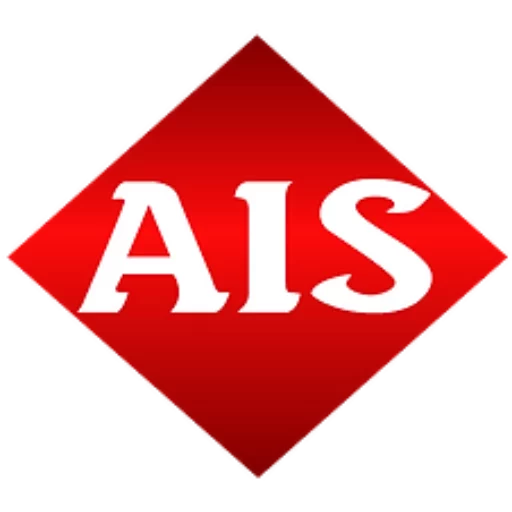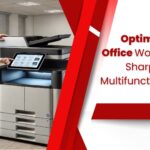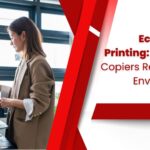How Much is a Copy Machine? A Look into Leasing vs. Buying Options

February 18, 2024
 0 views
0 views
 0 comments
0 comments
How Much is a Copy Machine?
Copy machine remains very important for office operations. These indispensable devices, ranging from simple monochrome printers to advanced multifunction printers (MFPs), streamline workflow, facilitate document management, and ensure that businesses run smoothly. However, the decision to lease or buy a copy machine can be as complex as the machines themselves.
This article delves into the nuances of copy machine costs, shedding light on the initial purchase price and the often-overlooked operational expenses. Therefore, it’s vital for businesses to weigh these factors carefully to make an informed decision that aligns with their printing and copying needs and overall budget.
Understanding Copy Machine Costs
Initial Purchase Price
The price tag of a copy machine can vary widely, influenced by an array of factors. At the entry-level, basic black and white printers and all-in-one inkjet models may cost just a few hundred dollars, making them suitable for small offices or low-volume printing tasks. On the other hand, high-end commercial copiers and production printers can easily run into thousands of dollars.

For instance, brands like Toshiba and Ricoh are renowned for their durable and sophisticated multifunction copiers that cater to a wide range of business needs, from scanning and faxing to high-volume printing. The average price of a machine is heavily dependent on its features, such as printing speed (measured in pages per minute or ppm), paper size compatibility, and the ability to perform multiple functions like printing, copying, scanning, and faxing.
Moreover, the machine cost is not just about the sticker price. Factors like the manufacturer’s distribution arm, technology type (whether laser printer or inkjet), and recommended monthly print volume play significant roles in setting the price. For a detailed exploration of printing and copying machines available in the market, resources like Associated Imaging Solutions offer comprehensive guides that can help businesses find a copier that’s precisely tailored to their requirements.
Operational Costs
Beyond the initial outlay, the operational costs of owning a copy machine are crucial to consider. These include ongoing expenses such as toner or ink refills, paper, energy consumption, and machine maintenance. For instance, the cost per cartridge and the yield (how many pages each cartridge can produce) can significantly affect the cost per page, a critical metric for businesses tracking their printing expenses. Similarly, high-capacity paper trays and energy-efficient models can help reduce operational costs over time.
Additionally, leasing a copier might include a service agreement that covers repairs and maintenance, potentially offering savings compared to out-of-pocket costs for owned machines. Understanding these hidden costs is paramount when making a decision. For businesses considering their options, the Small Business Administration provides valuable insights on financing equipment purchases, including copy machines.
Whether to lease or buy a copy machine depends on a myriad of factors, including immediate financial outlay, long-term operational costs, and the specific printing needs of a business. Above all, a thorough analysis of both upfront and ongoing expenses will ensure that businesses make a choice that not only suits their current needs but also aligns with their future growth and budget constraints.
Buying a Copy Machine
Advantages of Buying
When a business decides to buy a copy machine, it gains ownership and the freedom from long-term contracts. This means full control over the machine and its use, without worrying about monthly lease payments or usage limits.
Above all, for organizations with lower printing volumes, purchasing a copier outright can lead to significant cost savings over time. Without the need for lease payments, the only ongoing costs are for toner, paper, and occasional maintenance. This option appeals particularly to businesses that prefer a fixed investment and minimal recurring expenses.
Considerations When Buying
However, the initial capital requirement to buy a copier can be substantial. High-quality multifunction printers and commercial copiers often come with a hefty price tag, necessitating a significant upfront investment.
Furthermore, the risk of depreciation and obsolescence looms large. As technology advances, today’s cutting-edge photocopier machine may become outdated in a few years, potentially necessitating another large investment. These factors necessitate careful planning and consideration, particularly for small businesses or those with limited capital.
Leasing a Copy Machine
Benefits of Leasing
Leasing a copier offers a lower initial investment compared to buying. Flexible payment plans spread the cost over time, making it easier for businesses to manage their cash flow. Furthermore, leasing agreements often include maintenance and repairs, reducing the worry about additional costs. Perhaps the most compelling advantage is the access to the latest technology and easy upgrading.

Businesses can stay at the forefront of printing technology, swapping old models for new ones at the end of the lease term without a large upfront cost. This option is ideal for companies that prioritize having the latest features and capabilities to support their workflow and printing needs.
Whether to lease or buy a copy machine is a decision that hinges on numerous factors, including financial flexibility, technological requirements, and printing volume. Businesses must weigh these considerations against their operational needs and long-term financial planning to make the most beneficial choice.
How much does a copier contract cost?
The cost of a copier contract can vary widely depending on several factors, including the model of the copier, the volume of copies needed, the length of the lease, and any additional services included in the contract, such as maintenance and toner supplies.
Generally, monthly lease payments for a copier can range from $60 to $900. Businesses might opt for shorter-term leases for higher-end models, which could increase the monthly cost. Contracts often include service agreements that cover maintenance and repairs, which can help avoid unexpected expenses. It’s crucial to evaluate the specific needs of your business and compare quotes from different providers to get the best deal.
Making the Decision: Leasing vs. Buying
Assessing Your Business Needs
When it comes to deciding whether to lease or buy a copy machine, the first step is assessing your business needs. You need to consider the volume of copies per month your business requires and the functionality you need from a copier.
For instance, do you need a multifunction printer that can also fax, scan, and print in color, or would a simple monochrome photocopy machine suffice? Your budget is another critical factor. It dictates not just the initial cost you can afford, but also the ongoing expenses like toner refill, paper, and maintenance.
Additionally, consider your office space and IT infrastructure compatibility. The size of the copier must fit your available space, and it should easily integrate with your current network and workflow systems. Multifunction devices that offer printing, copying, and scanning in one unit can save space and simplify operations, but they require careful setup to work seamlessly within your IT environment.
Cost-Benefit Analysis
Comparing the total cost of ownership of purchasing a copier versus leasing over time is essential. Buying may involve a higher upfront cost but lower long-term expenses, as you won’t be paying monthly lease fees. However, leasing can offer a lower initial investment and the flexibility to upgrade to newer technology more frequently. This can be particularly beneficial if your printing needs change or grow.
The impact on cash flow and accounting is another important consideration. Leasing a copier can be beneficial for cash flow, as it spreads the cost over time. From an accounting perspective, lease payments can often be deducted as business expenses. In contrast, purchasing a copier is a capital expenditure with different tax implications.
What People Also Ask
What’s the average cost of leasing vs. buying a copier?
The cost varies widely depending on the model and features, but leasing can range from $60 to $900 per month, while buying can range from a few hundred to several thousand dollars upfront.
Can I upgrade my copier if I choose to lease?
Yes, one of the advantages of leasing a copier is the flexibility to upgrade to a newer model when your lease term ends. This allows businesses to stay up-to-date with the latest technology without a significant upfront investment, ensuring that your copying and printing capabilities meet your evolving needs.
What should I consider when choosing between a laser printer and an inkjet printer?
Consider print quality, speed, and cost. Laser printers generally offer faster printing and lower cost per page, while inkjet printers can provide higher quality color prints.
How do I determine my printing volume needs?
To determine your printing volume needs, start by reviewing your business’s past printing records to get an average of how much you print monthly. If you don’t have past records, estimate based on your business size, the number of employees, and the nature of your work. For instance, a law firm might need more printing than a small retail shop. Also, assess the types of documents you print most often—such as reports, brochures, or daily paperwork—and their volume.
Conclusion
Deciding whether to lease or buy a copy machine boils down to understanding your business’s specific needs, budget, and long-term goals. Leasing offers flexibility and access to the latest technology with lower upfront costs, while buying can be more cost-effective over time for businesses with stable printing needs.
Above all, carefully evaluate both options with a focus on how they align with your operational requirements and financial planning to make the most informed decision for your business.
For more information and services you can contact us for a free quote and estimation.
- Address: 165 Veterans Way, Warminster, PA 18974
- Email: sales@aispa.us
- Call Us: (215) 999-8445
Comments are closed.
Related Posts
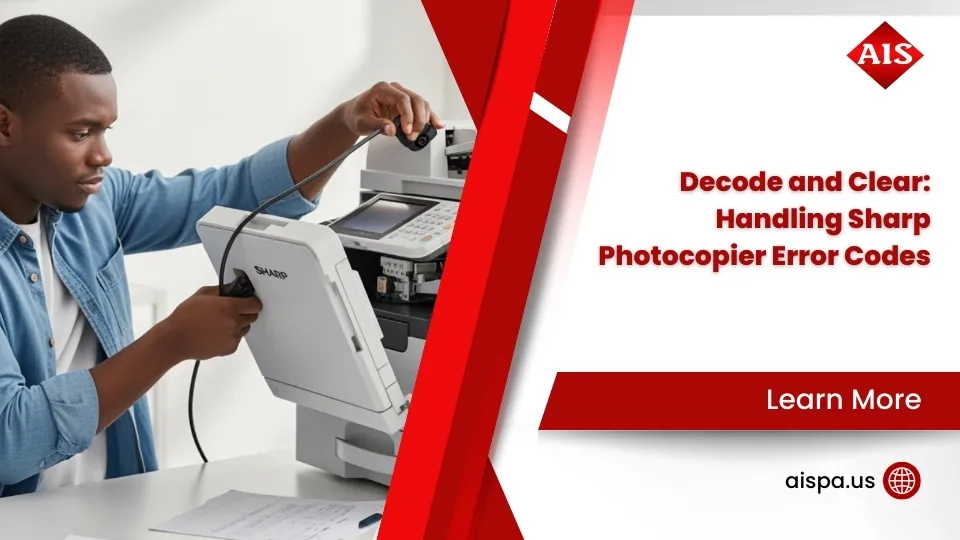
— Decode and Clear: Handling Sharp Photocopier Error Codes
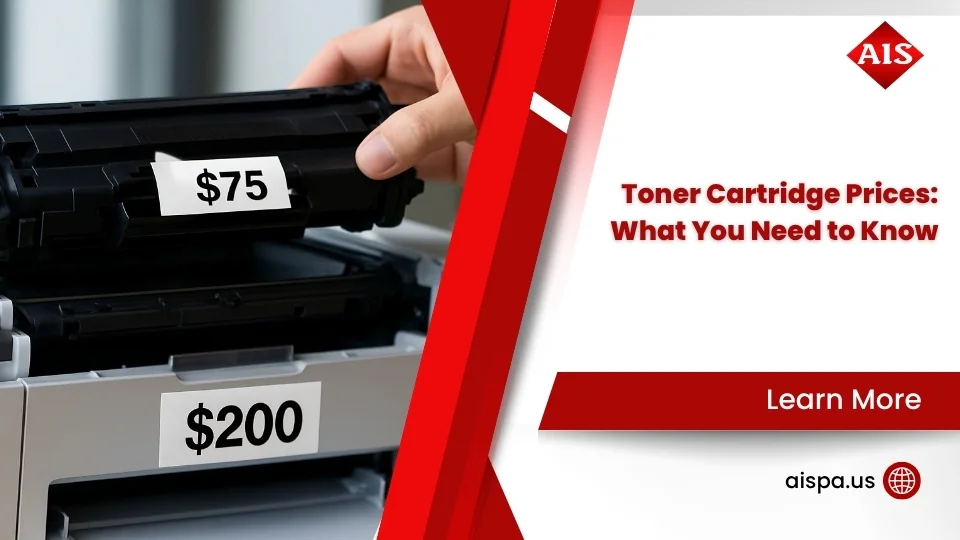
— Toner Cartridge Prices: What You Need to Know

